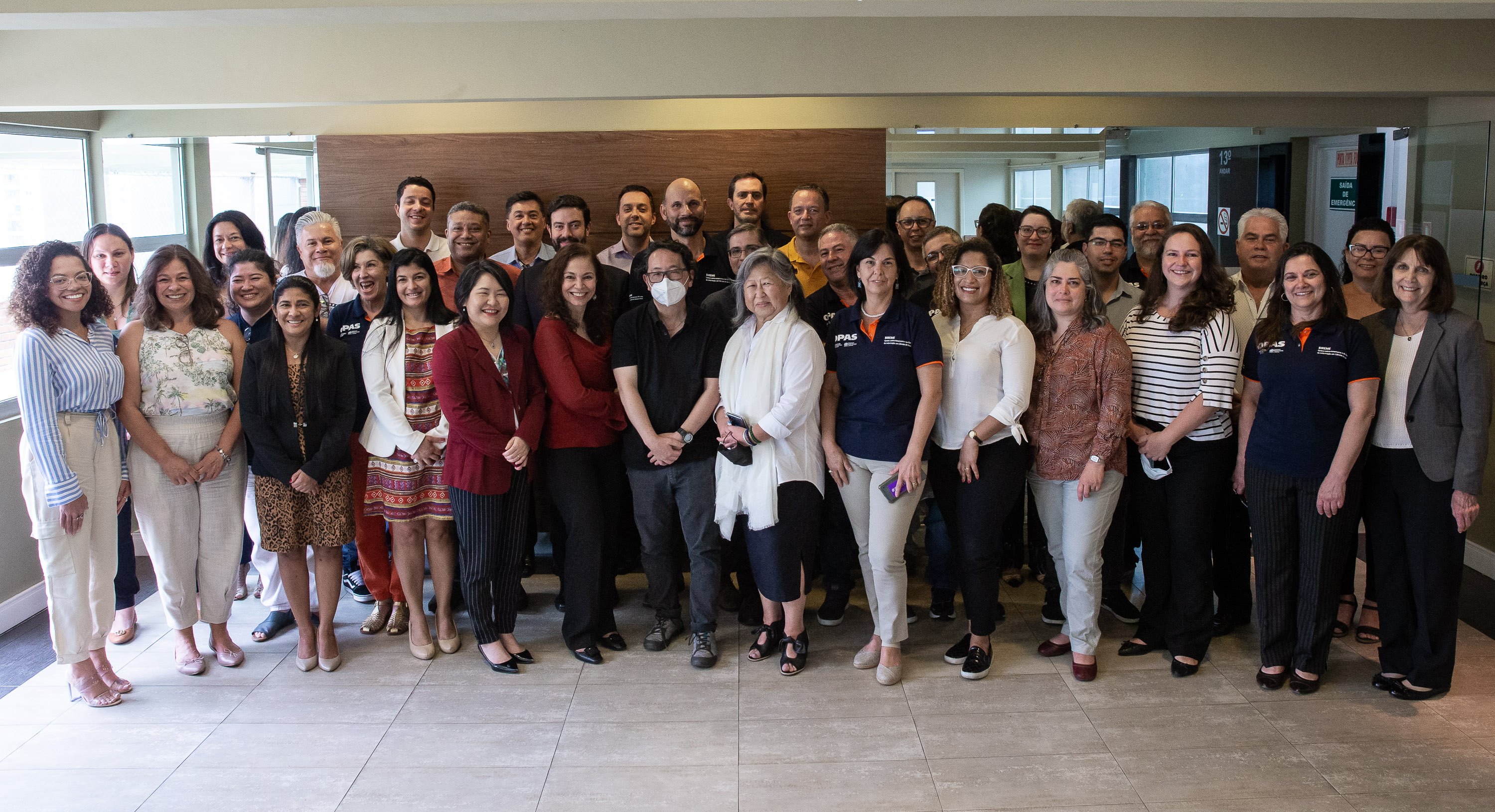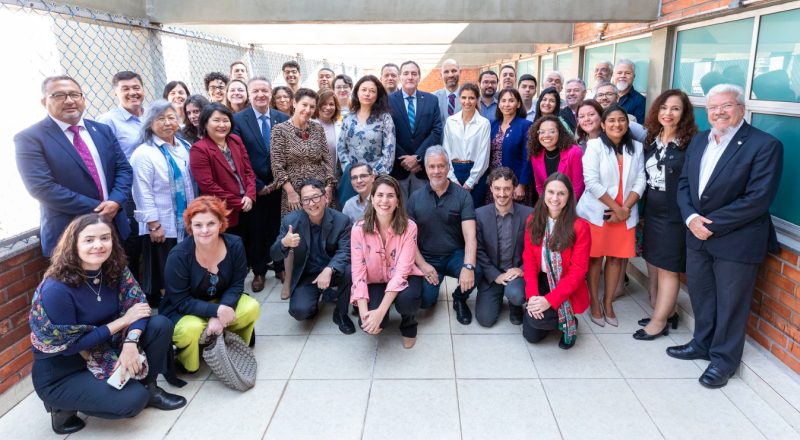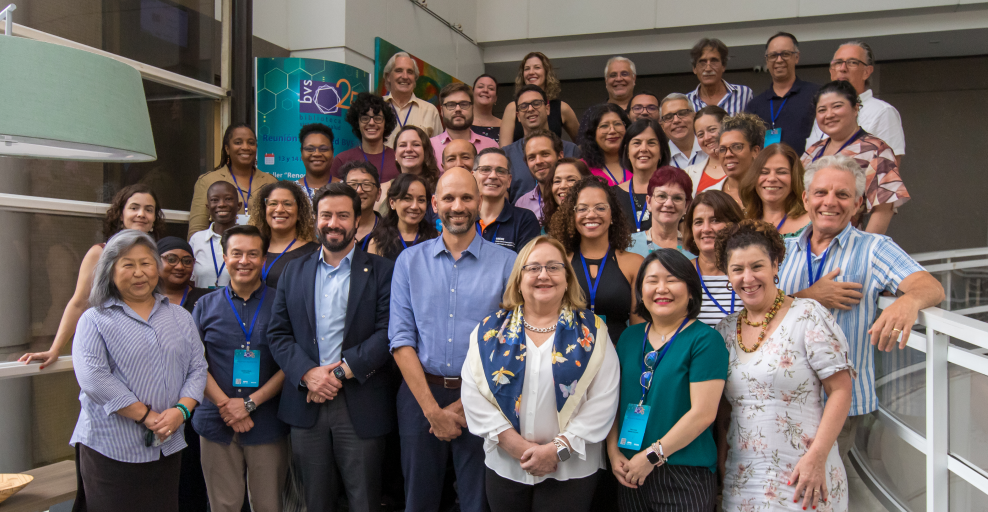The year 2023 was marked by important events for public health and the Pan American Health Organization (PAHO), with the beginning of Dr Jarbas Barbosa’s term as PAHO director in January and the announcement of the end of the global COVID-19 emergency in May. At BIREME, João Paulo Souza’s first year as director concluded with the approval of the new institutional strategy for the period 2023-2025, which aims to accelerate the digital transformation of the health information sector to achieve PAHO’s mission of “Health for All.”

In the context of the activities and conditions of technical cooperation developed and coordinated by BIREME, here are some of the highlights of 2023.
In February, BIREME launched the Advanced Course on Scholarly Communication at the PAHO/WHO Virtual Campus of Public Health, which focuses on the steps that follow the submission of a manuscript, including: evaluation of scientific and impact metrics, reproducibility of research results, and the importance of open science practices. The course is offered free of charge in Spanish, in self-learning mode without tutoring, and with certification for participants who achieve 70% success in the assessments.
Also in February, in view of the complex situation faced by the indigenous peoples of the Yanomami territory, BIREME developed and published the Window of Knowledge ‘Health Emergency in the Yanomami Territory’, with the aim of facilitating access to scientific evidence and relevant technical information for professionals working to address the public health emergency in the Yanomami territory.
In April, the 25th anniversary of the Virtual Health Library (VHL) inspired a series of events and initiatives to celebrate the impact and reach of the VHL throughout the Latin American and Caribbean Region. More than 180 members of the VHL Network from 25 countries in the Americas, Europe and Africa gathered for the anniversary webinar “Achievements, Challenges and Opportunities”. The Window of Knowledge ‘25 Years of the Virtual Health Library’ was also published, with a collection of documents selected in the VHL to document the historical moment and its trajectory.
The Innovation Lab to accelerate BIREME’s digital transformation was implemented in April, with the participation of representatives from all the Center’s teams and operations. The first BIREME product to be prioritized for digital acceleration was LILACS, the most important and comprehensive index of the technical and scientific literature on health in Latin America and the Caribbean.
Also in April, an office for BIREME was inaugurated in Brasilia, in premises provided by the PAHO Representation in Brazil. The aim of the new BIREME facility at the headquarters of PAHO Brazil is to collaborate with the regional and global presence of the Center, while increasing the involvement of institutional partners and optimizing the mobilization of financial resources.
In July, BIREME welcomed Dr Jarbas Barbosa in São Paulo, on his first mission to the country as PAHO director. During the three-day trip to São Paulo, BIREME was able to follow the director’s agenda with several high-level institutional partners that have great impact on the lives and health of the population. The article published in BIREME Bulletin No. 81 provides the details.

Regarding BIREME’s governance, at the 60th Directing Council of PAHO, BIREME updated its Statute (CD60. R11) and elected Cuba and Guyana as new members of the Center’s Advisory Committee for the period 2024-2026 (CD60. R9). Two annual sessions were held: the IX Session of the Scientific Committee and the XII Session of the Advisory Committee. At both meetings, the agendas focused on the presentation and evaluation of BIREME’s Strategy for the period 2023-2025, which was approved for implementation within its biennial work plan (BWP) 2024-2025.
In August, BIREME travelled to India to participate in the First WHO Global Summit on Traditional Medicine, where it was represented by its director João Paulo Souza, and members of the VHL Network for Traditional, Complementary and Integrative Medicine (VHL TCIM Americas). The event highlighted the Evidence Maps developed with the Brazilian Academic Consortium for Integrative Health (CABSIN), and the Information Platform of the Americas, with the display of digital posters, videos, Windows of Knowledge, and other carefully selected information sources to support the dissemination of scientific evidence around traditional medicines and their integration into health systems.
The last two months of the year were marked by the resumption of face-to-face events organized by BIREME. In November, a series of four technical meetings with members of the VHL network were held in São Paulo to conclude the celebration of the 25th anniversary of the VHL, to reorient the VHL model, and to develop strategic planning and new health information products and services with institutional partners.
The final event of the year was held on December 13, with a meeting to recognize the Center’s results and values, with the participation of all employees. With recreational and social activities on its program, the event was part of the Center’s engagement work plan, which has several lines of action including the forum to support staff commitment and the continuous improvement of BIREME/PAHO/WHO in line with the “OPS Adelante” initiative. See details in the article published in BIREME Bulletin N. 84.

For the evaluation of BIREME’s performance 2022-2023 biennium, still focusing on the 2023 results, the following developments were also highlighted:
- Information sources and access to the VHL, LILACS, DeCS/Mesh portals;
- Global Actions and Alliances, with emphasis on projects with the WHO; technical cooperation with PAHO/EIH on information products and scientific evidence; Evidence Maps, New SOF (Second Formative Opinion), reactivation of the RIPSA Portal and Operations and Project Management.